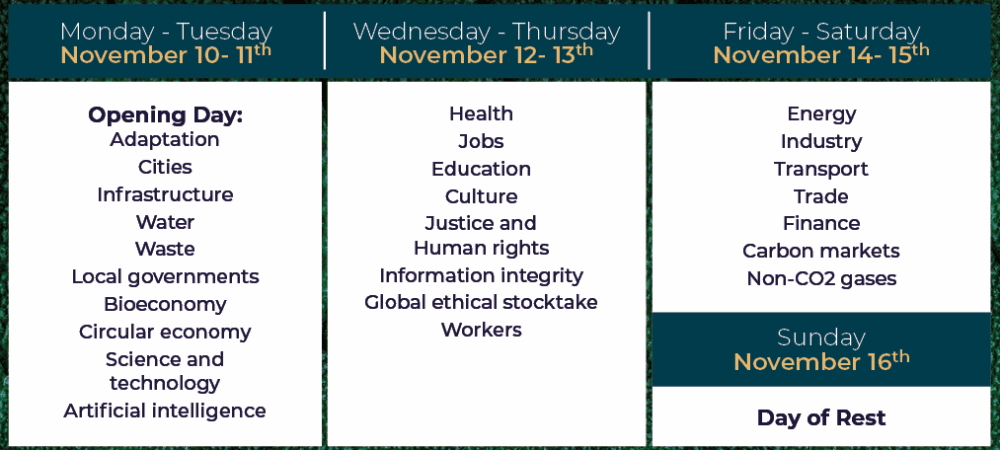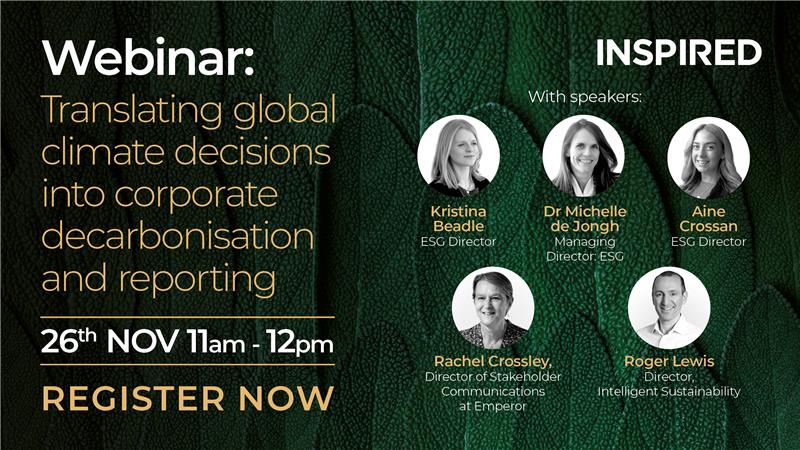
COP30 Week One Round-Up: What You Need to Know
Here's everything you need to know about the key developments from week one of COP30.
COP30 officially opened on 10 November 2025 in Belém, Brazil, marking the 30th UN Climate Change Conference. The summit runs until 21 November and is being called the “COP of Truth,” with a strong emphasis on implementation rather than new promises.
Key Developments Last Week
1. U.S. Federal Absence – But States Step In
For the first time since COP began in 1995, the United States did not send an official federal delegation. President Trump declined to participate, calling climate goals vague. However, over 100 U.S. state and local leaders, including California Governor Gavin Newsom, attended under the U.S. Climate Alliance banner, pledging action on clean energy and adaptation.
2. Indigenous Protests and Social Justice
Indigenous activists staged high-profile protests inside the Blue Zone, demanding stronger protections for land rights and an end to Amazon deforestation. These demonstrations highlighted tensions between COP’s formal negotiations and grassroots climate justice movements.
3. Nationally Determined Contributions (NDCs)
The Alliance of Small Island States (AOSIS) pushed hard for countries to update their NDCs, calling the 1.5°C limit “a lifeline.” So far, 114 countries have submitted new or updated NDCs.
4. COP32 Location Confirmed
The next African-hosted COP will take place in Addis Ababa, Ethiopia, in 2027 (COP32). This decision was announced during COP30 after Ethiopia beat Nigeria’s bid. COP31 (2026) remains undecided between Australia and Turkey.
5. Tackling Climate Disinformation
On 12 November, the Global Initiative for Information Integrity on Climate Change launched the Declaration on Information Integrity, endorsed by 12 countries including Brazil, France, Germany, and Canada. This is the first time COP has formally addressed climate misinformation, committing to protect journalists and promote evidence-based information.
6. Health and Climate: Brazil’s Belém Health Action Plan
Brazil unveiled the Belém Health Action Plan, the first global climate-health adaptation framework. Backed by WHO and 80 countries, it aims to build climate-resilient health systems through surveillance, innovation, and equity. A coalition of philanthropic organisations pledged $300 million to kickstart implementation.
Wider themes covered across the week included:

How has Inspired contributed?
Across the week, Inspired’s experts and partners have been sharing insights through blogs on selected COP30 themes. These posts explore topics such as adaptation and resilience, climate finance, health and equity, and the role of technology in accelerating the transition.
If you haven’t seen them yet, check out our COP30 hub for deep dives and practical perspectives on what these developments mean for businesses and communities.
November 10th-11th: Cities, Infrastructure and Water
- Why Climate Resilient Cities are Non-Negotiable
- Is AI and Green Innovation Driving the Net-Zero Transition?
- Local Authorities: Leading the Climate Action at Ground Level
- Turning Waste Into Climate Solutions
November 12th-13th: Health, Jobs and Education
- The Hidden Cost of Climate Change on Human Productivity
- Cutting Through the Noise with Meaningful Climate Reporting
November 14th-15th: Energy, Industry and Transport
- Linking the Financial System Together
- Using Risk, Carbon Markets and Taxes for Climate Mitigation
- Energy Security: Navigating the Transition to Low-Carbon Power
What Happens Next?
Week Two of COP30 brings a fresh set of themes for negotiation and discussion:
- November 17–18: Forests, Oceans, and Biodiversity
- November 19–20: Food, Agriculture, and Equity
Inspired will continue to publish expert blogs aligned with these topics, offering insights into what these developments mean for businesses and sustainability strategies. Keep an eye on our COP30 hub for the latest updates and analysis.
Upcoming Webinar: Translating Global Climate Decisions into Corporate Action
- Date: 26 November
- Time: 11:00 AM – 12:00 PM (GMT)
As COP30 concludes, join us for an exclusive webinar:
“Translating Global Climate Decisions into Corporate Decarbonisation and Reporting.”
We’ll unpack the outcomes of COP30—covering finance, energy security, and barriers to progress—and translate these into practical steps for corporate decarbonisation and ESG reporting.
Speakers include:
- Dr Michelle De Jongh, Managing Director of ESG, Inspired
- Kristina Beadle and Aine Crossan, ESG Directors, Inspired
- Rachel Crossley, Director of Stakeholder Communications, Emperor
- Roger Lewis, Director, Intelligent Sustainability
Why attend?
- Understand what COP30 decisions mean for your business
- Learn actionable strategies for ESG reporting and compliance
- Gain insights from leading sustainability experts











